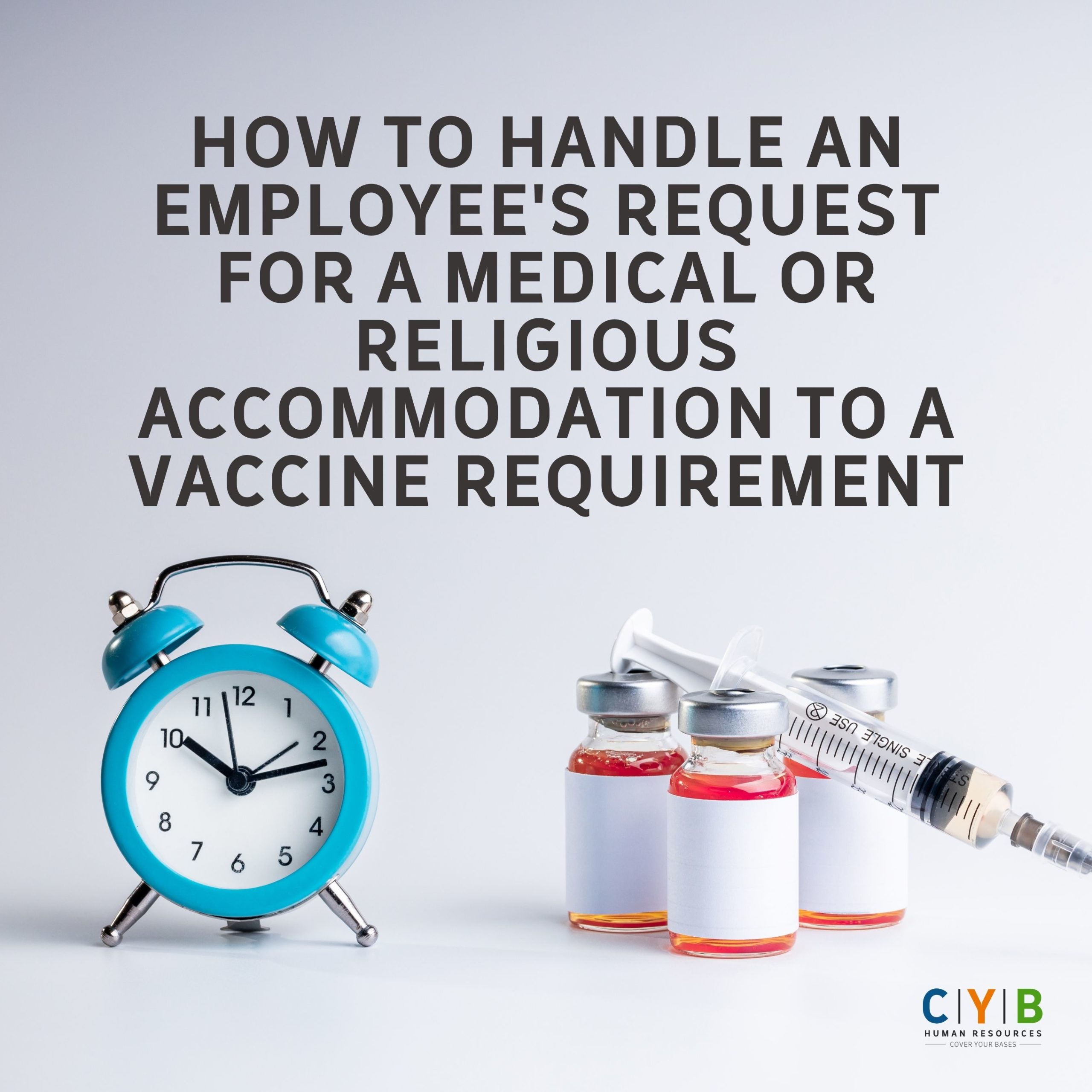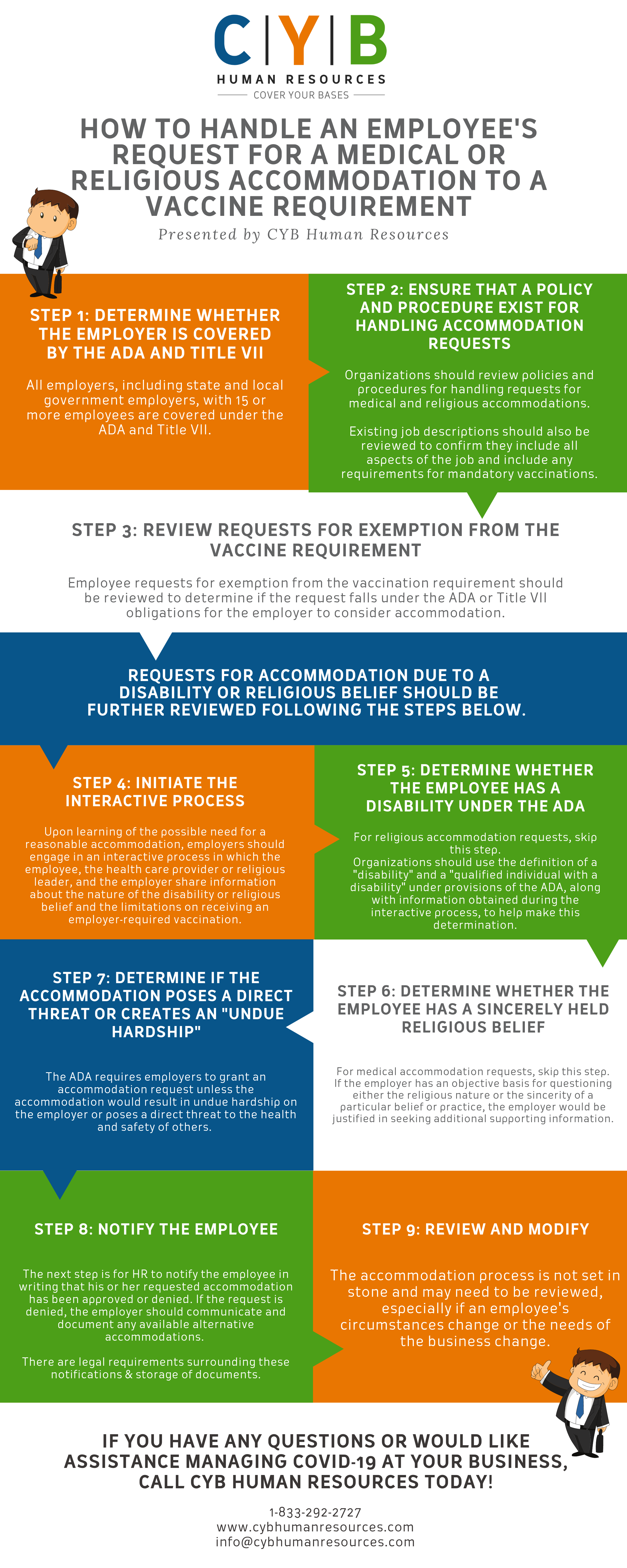
Vaccine Requirements are Here and it is Your Responsibility as an employer to remain compliant with the law.
Many employers require employees to receive vaccinations to reduce the spread of communicable diseases in the workplace. Flu vaccine requirements have been a common practice for years and the COVID-19 vaccine is following suit. Employers who require employees to receive the vaccine should know that federal law allows employees to ask to be exempted from the requirements due to medical or religious reasons.
This guide takes you through the steps to handle a current employee’s accommodation request to be exempt from the employer’s vaccination requirements.

STEP 1: DETERMINE WHETHER THE EMPLOYER IS COVERED BY THE ADA AND TITLE VII
All employers, including state and local government employers, with 15 or more employees are covered under the ADA and Title VII. Federal government employers are also covered by Title VII; however, for disability accommodations, federal government employers must comply with the Rehabilitation Act of 1973 instead of the ADA, although the protections are very similar.
STEP 2: ENSURE THAT A POLICY AND PROCEDURE EXIST FOR HANDLING ACCOMMODATION REQUESTS
Organizations should implement or review their policies and SOPs or handling requests for medical and religious accommodations.
Job descriptions should also be reviewed to confirm they include all aspects of the job and include any requirements for mandatory vaccinations.
STEP 3: REVIEW REQUESTS FOR EXEMPTION FROM THE VACCINE REQUIREMENTS
Employee requests for exemption from the vaccination requirements should be reviewed to determine if the request falls under the ADA or Title VII obligations for the employer to consider accommodation. A request for exemption due to a personal preference not to receive a vaccine is not protected by law, and the employer should reiterate the company policy and the consequences for not complying with the vaccination mandate.
Requests for accommodation due to a disability or religious belief should be further reviewed following the steps below:
STEP 4: INITIATE THE INTERACTIVE PROCESS
Upon learning of the possible need for a reasonable accommodation, employers should engage in an interactive process in which the employee, the health care provider or religious leader, and the employer share information about the nature of the disability or religious belief and the limitations on receiving an employer-required vaccination.
STEP 5: DETERMINE WHETHER THE EMPLOYEE HAS A DISABILITY UNDER THE ADA
For religious accommodation requests, skip this step.
Organizations should use the definition of a “disability” and a “qualified individual with a disability” under provisions of the ADA, along with information obtained during the interactive process, to help make this determination.
STEP 6: DETERMINE WHETHER THE EMPLOYEE HAS A SINCERELY HELD RELIGIOUS BELIEF
For medical accommodation requests, skip this step.
For medical accommodation requests, skip this step.
If the employer has an objective basis for questioning either the religious nature or the sincerity of a particular belief or practice, the employer would be justified in seeking additional supporting information.
STEP 7: DETERMINE IF THE ACCOMMODATION POSES A DIRECT THREAT OR CREATES AN “UNDUE HARDSHIP”
The ADA requires employers to grant an accommodation request unless the accommodation would result in undue hardship on the employer or poses a direct threat to the health and safety of others.
STEP 8: NOTIFY THE EMPLOYEE
The next step is for HR to notify the employee in writing that his or her requested accommodation has been approved or denied. If the request is denied, the employer should communicate and document any available alternative accommodations.
There are legal requirements surrounding these notifications & storage of documents.
STEP 9: REVIEW AND MODIFY
The accommodation process is not set in stone and may need to be reviewed, especially if an employee’s circumstances change or the needs of the business change.
Schedule a call with us today if you have any questions on how to manage COVID-19 at your business.
